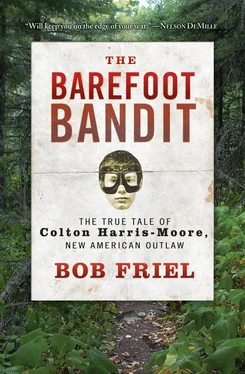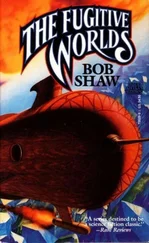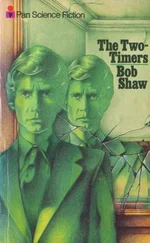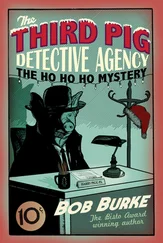He peered in… no body, no blood. The chief’s first thought was that the pilot was injured and either stumbling around incoherent or trying to walk his way off the ridge to find help. The idea that this was a stolen plane never entered his mind. He got on the radio and ordered a search-and-rescue mission, calling in tracking dogs and teams from his force and the Yakima County Sheriff’s Office, along with volunteers. Then he called in the tail number of the plane to the Washington State Patrol so they could pull up the registration and find out whom he was searching for.
Bob Rivers had just gotten off the air at 10 a.m. after a typically entertaining four hours of commentary, interviews, and repartee with his radio team when his boss walked into the studio holding a cordless phone. He said there was a state policeman from Yakima who wanted to speak to Bob… because his plane had just crashed on the Indian reservation.
Rivers’s first thought was that it was a prank call, an occupational hazard when you’ve spent twenty-plus years doing comedy bits and song parodies like “Cheeseburger with Parasites” and the Christmas favorite “Buttcracker Suite.”
The cop asked if he was really speaking to Bob Rivers. “I answered yes, and waited for the punch line,” says Rivers. “But he said, ‘Oh, I’m very glad to hear your voice because, obviously, that means it wasn’t you in your plane.’”
Rivers suddenly realized the guy was serious. There must be a mistake, he told the officer. “My plane is in its hangar on Orcas Island.” No way his Cessna could have been in the air that day. He certainly hadn’t flown it, and even though friends sometimes took the plane up, they always asked first. Besides, this was definitely a no-fly day. Just an hour before, as their newswoman read the local weather, the thought that shot through pilot Bob’s weather-obsessed mind was, Boy am I glad I’m not flying in that!
The statie read out the plane’s tail number: November 2-4-6-5-8.
“Yes, that’s my number,” Rivers told him. “But a lot of people confuse the 8 with a B because tail numbers usually end with a letter.” He heard the cop relay the message to the tribal police chief who was standing next to the plane. After a moment he came back on the phone: “Nope, he says it’s definitely an 8, not a B. It’s your plane.”
RIVERS’S PHONE BEGAN RINGING off the hook: the National Transportation Safety Board (NTSB), FAA, San Juan County Sheriff’s Office, Bureau of Indian Affairs, and FBI. The realization that his plane had been stolen began to sink in. They had no suspects, but at least, thought Rivers, with all these organizations involved and the search teams scouring the landing site, they’d be sure to catch the crook and solve the case instantly. The thief had a forty-five-minute head start, but he was outnumbered and had experienced Yakama hunters and tracking dogs on his trail.
Then Rivers received a disheartening call. “They told me that since it was now a law enforcement matter and not a rescue that they’d called off the search so no volunteers would be endangered.”
Rivers’s hopes sank, only to be lifted again by a call from Chief Shike telling him not to worry, that there were only two ways out of the area and one of those would mean a thirty-mile hike. The chief told Rivers that his officers were keeping close watch on the only sensible route anyone would use to get off the mountain on foot.
Colt watched the searchers from his hiding place in the woods, then struck out east, taking the long route no one expected.
THE NEXT MORNING, THE thirteenth, the chief called Bob Rivers again. Bad news, he said, a logging truck driver reported seeing a white male, soaked to the skin, walking out of the Place Where the Wind Lives sometime around 5 a.m.
“I asked him about the status of the investigation, the FAA, the FBI, all the boys,” says Rivers. “He told me, ‘The investigation has been turned over to me… and I have concluded the investigation. Your insurance company may take the plane.’”
In fact, the chief insisted that Rivers remove the plane as quickly as possible because he was forced to keep one of his men up in the hills babysitting its carcass twenty-four hours a day or else, he said, the boys on the rez would shoot it to pieces just for target practice.
Tribal police collected a vomit sample but no other forensics from the plane. (Questions arose later as to the handling of the sample and delays in testing. Ultimately, it was tested three times but never came back with usable DNA.)
Rivers was crestfallen. “So that was it: white suspect, property crime, some rich guy’s toy… No one really cared and they’d never find out who took my plane.”
The one person who did know kept moving.
Dressed in just shorts, a sweatshirt, and shoes he says were two sizes too small, Colt claims he hiked for four days with no food, subsisting on two bottles of Gatorade. Toppenish Mountain east of the landing site resembles parts of the Afghan Central Highlands. Instead of the Khyber Pass, though, Colt had access to roadways cut by the Bureau of Indian Affairs. For the first day and a half even the weather cooperated, offering him unseasonably warm temperatures 20 degrees above average. After that, it stayed a balmy 60 during daylight, but fell to below freezing at night. Colt says he hiked thirty miles to the tracks of the Northern Pacific Railway, where he hopped a freight to Oregon, jumped off, stole a car, and drove it to Reno, Nevada. Colt says he spent most of the winter in Reno, staying with a friend.
Meanwhile, back on the Wild West’s watery frontier, the residents of Orcas Island woke on November 12 to a big breakfast of WTF?
As soon as he’d gotten the call from the state police, Bob Rivers phoned his friend and plane mechanic, Geoff Schussler, and asked him to go check the hangar. Schussler found a whole lot of empty where the Cessna should have been.
Two San Juan County sheriff’s deputies responded to the call. Schussler had taken great pains not to touch anything, but he says the deputies shrugged it off, giving a cursory look and telling him that “there weren’t any good surfaces” to check for prints. Schussler looked around at a lot of smooth metal and hard plastic that the thief had to touch to break in, find the key, and get the plane out of the hangar. “This was an airplane,” he says, “not a stolen bike… I thought they’d take it more seriously.”
If they had successfully lifted a print, the San Juan County Sheriff’s Office would have instantly found that their suspect had been in the system for a very long time considering his age. They would have gotten an earful about him and his MO from their law enforcement brethren down in Island County. With that information, they might have figured out that this wasn’t Colt’s first Orcas crime by a long shot. As it was, though, it’d be nine months and many more local crime scenes and victims before they even knew whom they were dealing with.
Word of the plane theft spread at small-island gossip speed—a startling velocity equaled only by the rate at which facts twist. Orcas has just five thousand full-time residents, and each exists within one degree of separation from everyone else on the fifty-seven-square-mile island. Like in any small community, but especially a small-island community, anybody’s business is everybody’s.
No one had ever heard of a plane theft before, certainly not one in a place where a puppy caught chasing chickens makes the newspaper’s police report. This was the kind of crime, though, that locals could relish. It was extremely rare, which appealed to our sense of exceptionalism. It was bizarre, which fit the eccentric nature of the island. And hardly anyone felt threatened because it wasn’t random and it was hard to identify with. Very few people are lucky enough to even have an airplane to steal, so it was like hearing that someone’s pet koala had run away. “Gee, that’s a shame… I wish I had a koala.”
Читать дальше












